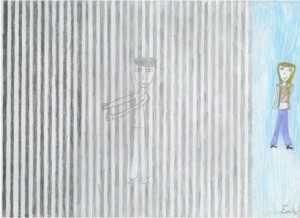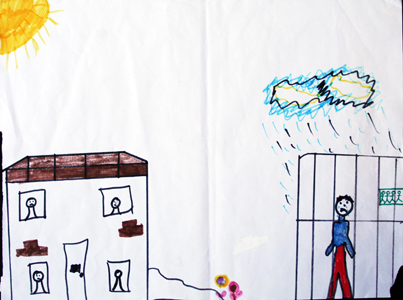
Albie Sachs is a South African judge who haunts the U.S. prison system. Why? Because he is a decent human being, that’s why. He decided to listen to a woman colleague. He decided that primary caregivers of children should not be sent to jail. Here’s a version of the story:
“Albie Sachs…was fleetingly in the UK last week, primarily to tell the story behind the judgment he made in South Africa not to send a woman to prison because it would infringe the human rights of her three children.…
“Judges are the storytellers of the 21st century,” says 74-year-old Sachs….
At first sight, he had intended to throw out an appeal on behalf of Mrs M, who was facing four years in jail for up to 40 counts of credit card fraud that she had committed while under a suspended sentence for similar offences. “I remember drafting an extremely dismissive response. I said: ‘This doesn’t raise a constitutional question. She simply wants to avoid going to jail. She doesn’t make out a case, and her prospects of success are zero.’ “It was a female colleague…who insisted that the case be heard. She argued that the human rights of the accused woman’s children were not being looked at separately.
“She said: ‘There is something you are missing. What about the children? Mrs M has three teenage children. She lives in an area that we politely call fragile, an area of gangs, drug-peddling and a fair amount of violence. The indications are that she is a good mother, and the magistrate gave no attention to the children’s interests.’
“The minute my colleague spoke to me about the importance of the three teenage children of Mrs M, I started to see them not as three small citizens who had the right to grow up into big citizens but as three threatened, worrying, precarious, conflicted young boys who had a claim on the court, a claim on our society as individuals, as children, and a claim not to be treated solely as extensions of the rights of the mother, but in their own terms.”
As a result, Sachs created a legal precedent in 2007: a woman who otherwise would have gone to jail did not have to, because of her children’s rights. “We could have said the children’s rights must be considered but sent Mrs M to jail anyway, perhaps for a lesser term. But that would not have changed anything.”…
Although three judges dissented from the majority verdict, the precedent was set in South Africa that – at least in borderline cases – primary caregivers of children should not be sent to jail. And if the court decided to jail a primary caregiver, it had to take some responsibility for what happens to the children. “The court can’t simply say that she should have thought of that before she committed the offence, or that she can’t hide behind her children.”…
At the time he was drafting the judgment, Sachs did not know of any country that took the rights of offenders’ children into account, but he subsequently discovered that similar ideas were being framed in Scotland in a report by the then children’s commissioner, Kathleen Marshall. The report, Not Seen, Not Heard, Not Guilty, argues that the rights of offenders’ children to family life under the UN Convention on the Rights of the Child are systematically ignored by the court system. The report found that almost two-thirds of prisoners in the Cornton Vale women’s prison in Stirling had children under 18, but there was no provision to take their rights into account during sentencing.
“This was astonishing,” Sachs told the audience. “In a totally different legal system, in a totally different society, a conclusion was being reached that is almost identical. It showed that the time has come for new ways of thinking.””
Albie Sachs haunts the United States, home of “the incarceration generation”: “The chances of seeing a parent go to prison have never been greater, especially for poor black Americans, and new research is documenting the long-term harm to the children they leave behind. Recent studies indicate that having an incarcerated parent doubles the chance that a child will be at least temporarily homeless and measurably increases the likelihood of physically aggressive behavior, social isolation, depression and problems in school — all portending dimmer prospects in adulthood. “Parental imprisonment has emerged as a novel, and distinctly American, childhood risk that is concentrated among black children and children of low-education parents,” said Christopher Wildeman, a sociologist at the University of Michigan who is studying what some now call the “incarceration generation.” Incarceration rates in the United States have multiplied over the last three decades, in part because of stiffer sentencing rules. At any given moment, more than 1.5 million children have a parent, usually their father, in prison, according to federal data. But many more are affected over the course of childhood, especially if they are black, new studies show. Among those born in 1990, one in four black children, compared with one in 25 white children, had a father in prison by age 14. Risk is concentrated among black children whose parents are high-school dropouts; half of those children had a father in prison, compared with one in 14 white children with dropout parents, according to a report by Dr. Wildeman recently published in the journal Demography. For both blacks and whites, the chances of parental incarceration were far higher than they were for children born just 12 years earlier, in 1978.”
None of this is new, news or surprising. Cage the fathers, superexploit the mothers, forget the children. It’s simple. Put a nation of mothers behind bars, where too often there are no fathers or other guardians around and there is no public support, and you imprison the children. Where’s the surprise? Shackle pregnant women prisoners in labor and delivery, in the name of security. Are you surprised? This has all been said before. It’s common knowledge.
In South Africa, Albie Sachs acted. In Scotland, so did Kathleen Marshall. In the U.S., it’s time, it’s way past time, for similar action.

(Image Credit: http://childrenofprisoners.eu)